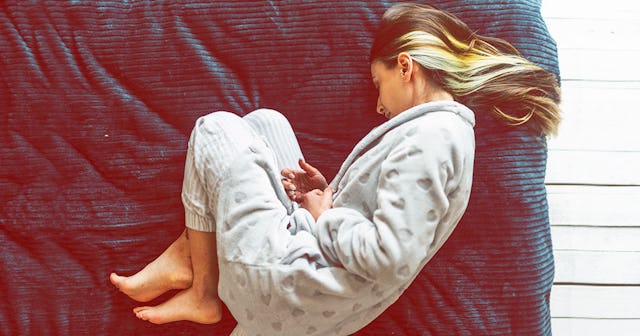I Couldn’t Physically Parent My Own Child––Living With Crohn's Disease

As an ex-teacher, mothering was something I approached in the same way I approached my academic life. I was an A student in Education and, as soon as I found out I was pregnant, I became an A student in Mothering.
I sat in the back of the biggest bookstore in my town, colorful stacks of parenting books on the wooden desk in front of me: sleep methods, baby whispering, feeding routines, parenting philosophies. I stayed for hours, devouring every piece of advice available — and there is a ridiculous amount available. I puzzled my way through contradictory approaches until I found one that sat well with me.
Attachment parenting seemed perfect, most likely because it’s the complete opposite to how I was mothered. My own mother left when I was six and my sisters and I were raised by our dad.
Mothering was almost a blank slate and I was determined to research every aspect of it. It became an obsession.
With my method of parenting researched and selected, I swaddled, sung, swayed, and shushed my way through the baby years. I carried my little girl everywhere, pressed up against my heart, and enriched her life with books, music, friends, and nature.
Then, when she was two, I got sick and none of my book learning mattered. I was failing at mothering.
“I’ll be fine once I can get a full night’s sleep,” I told my worried husband. I pushed aside the strange pains in my body. There was no time to focus on myself when a small child occupied my days and nights.
Boy_Anupong/Getty
My daughter was born premature and from day one I was sleeping less than 45 minutes at a time. Trying to keep up with the two-hourly feeding schedule of an early baby is a full-time job. Even at age two she didn’t sleep well, which meant I wasn’t either. Most of the research and prep I’d done didn’t apply to a sick, premature baby.
It was more than exhaustion though. Eventually my body refused to be ignored. I crawled in a fetal position. My husband called an ambulance.
Two weeks later, 24 pounds dropped from my already slim body, I returned home. I was unable to eat solid food and lived with constant waves of pain. The doctors diagnosed Crohn’s disease; armed me with handfuls of medication.
“Let’s hope for remission,” they said. “That’s all we can tell you. It’s different for everyone.”
Trapped in bed for months by my broken body, I started to write. I propped myself on pillows, my neck too weak to hold my head up, and typed into my laptop. In between restless naps, I crafted parenting articles for nationwide magazines. To my surprise, editors snapped them up and asked for more. I’d always wanted to be a writer; now it was the only thing I could do.
It’s a strange thing working as a parenting writer when you can’t physically parent your own child. I wrote “Fun Activities to Do in Winter” and “Ways to Help Your Child’s Speech.” I used the experiences from the past two years as anecdotes and inspiration. Writing about them made me feel connected to my mother-identity, even though all the parenting was now left up to my husband. I sat in bed and wrote.
For a year, I watched life from the sidelines.
I loved cuddles with my daughter but, with a wiggling two year old, even that was too painful at times. Books and words became our main way to connect. Sitting beside each other in bed, I could read out loud to her, show her my work, tell her funny stories about herself. I made up children’s stories just for her which she asked for on repeat. “Read the one about the zoo, mummy!” “Make me a story about a spy!”
I wrote to encourage other mothers. I wrote to entertain my daughter. I wrote to comfort myself.
My health slowly improved. One morning, I watched my little girl play with her aunty on the lounge floor. They rolled around pretending to be lost in a jungle, both giggling wildly. “There’s no way I’d have the energy for that,” I thought, forcing myself to laugh along with them. Today was a bad day. But yesterday had been good. I’d eaten. I’d been able to move around.
I sat on the couch, watching my daughter laugh, and started to question myself. Is it really impossible for me to play with her or do I not want to? It had been a long year of hospital stays, bed-rest, and pain. Perhaps I was giving up my mothering: letting go so it didn’t hurt so much when I couldn’t do it. Like my mother couldn’t. Mothering isn’t always what we expect or plan for; it can be painful and complicated.
Over ten years later, my now pre-teen and teen daughters snuggle in beside me on the couch; they read their own stories out loud. There are days when that’s all I can do — listen, read aloud, snuggle. There are weeks when they look after me more than I look after them. I’m far from the perfect parent I set out to be, but who needs perfect? Cuddles and stories come pretty close.